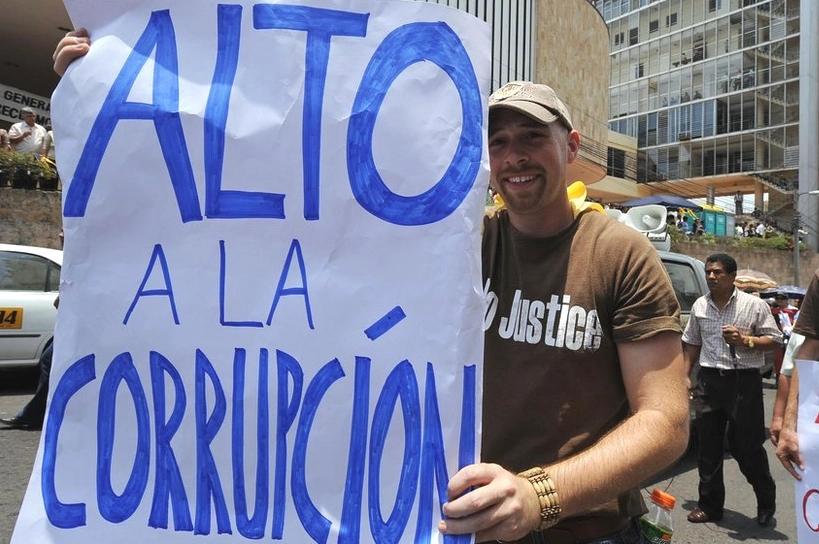Earlier this year, Transparency International published the full Corruption Perceptions Index 2023 (CPI) report, which ranks 180 countries and territories around the world according to their perceived levels of corruption in the public sector, scoring on a scale from 0 (highly corrupt) to 100 (very clean).
According to the data, more than two-thirds of the countries analyzed scored below 50, bringing the global average to 43, with countries making no progress at all or even lowering their score. In addition, 23 countries reached their lowest score.
In the Americas, the data remains negative. Only two countries in the region improved their scores (Guyana, with 40 points, and the Dominican Republic, with 35). All the others declined. In some cases, the drop was significant, as in the case of Saint Lucia, down 16 places; Guatemala, down 9 points; Argentina, Honduras, and El Salvador, down 8 places. The drop in points even affected well-placed countries in the index, such as Canada and Chile, which fell 7 points in the ranking.
The CPI also shows that democracy matters in a country’s score. The worst positions went to Nicaragua, Venezuela, and Haiti. In the case of Nicaragua, the score was 17, having dropped 11 points since 2014. Haiti also scored 17 points, dropping 5 from 2017. Venezuela, meanwhile, ranked last among the American countries, with only 13 points.
Independence of the judiciary.
Given this, one wonders about the reasons for such negative results in the Americas, and it is here that the connections with each country’s perception of democracy stand out. The lack of independence of the judiciary, which leads to impunity in corruption cases, sends the message that there are sectors of society that are immune to the law and confident that public institutions — and authorities — will not be held accountable for corruption cases involving them. This is a control of the Judiciary that comes from other — or powerful — powers and allows certain sectors to continue taking advantage of public affairs as if there were no rule of law to respect.
The lack of independence of the Judiciary comes from the controversial interference of other powers, such as the Executive, in the appointment of these magistrates who will act in these corruption cases, which opens a space for political contamination of something that should only be investigated according to the law.
It is already known that the total impartiality of judges is an illusion, as we all have preconceptions about the world inside our minds. However, appointments to high courts that do not favor technique, but rather personal contacts between designators and appointees, call into question many basic guarantees necessary for a proper fight against the scourge of corruption. For instance, the impartiality that should be exercised in the investigation and adjudication of cases.
Undue intervention in the judiciary discredits it in the eyes of those who suffer daily the effects of corruption, due to the lack of minimum conditions for a dignified life. And from this discredit and the loss of the feeling that cases can be effectively punished, comes the disbelief that democracy serves what it claims to be, a better life in society.
Not surprisingly, The Economist’s Democracy Index 2023 follows the same line as the CPI 2023, based on a scale of 10.0 to 0.0, where 10.0 to 8.0 indicates full democracy; 7.9 to 6.0 is failed democracy; 5.9 to 4.0 are hybrid regimes; and 3.9 to 0.0 are authoritarianism.
The report points out that it was a very difficult year for democracy worldwide, but even more so for Latin America. According to the data, it was the eighth consecutive year of democratic regression in the region, where the average score fell from 5.79 in 2022 to 5.68 in 2023. In addition, two-thirds of the 24 countries in the region recorded a drop in their scores, another 5 a stagnation and only 3 others an improvement. The biggest drop in the index occurred in Central America, in El Salvador, Nicaragua, Guatemala, and Honduras.
Perceptions
The combined analysis of these data indicates that although elections are held regularly, there is an electoral process and there is participation, people do not perceive changes that translate into an improvement in their quality of life. The perception still prevails that there is no adequate accountability by authorities and institutions, and there is a social stratification that protects the upper classes from the weight of the law and excessively punishes the base of the pyramid, deepening not only economic but also social inequality, even promoting a kind of classification of citizens according to the privileges that exist in a state.
One could even argue that this classification also considers factors such as race, gender and social class, which can make a person more or less privileged according to the institutions and the law in force.
The fight against corruption in the Americas has indeed been highly politicized, as has the very concept of democracy. Both have been contested by ideological narratives that do nothing more than perpetuate corruption and weaken democracies. As a result, it has become taboo to talk about fighting corruption without sounding like an attack on an opposing ideological position. Efforts to fight corruption must be revived without allowing the judiciary to be manipulated so that it is not properly investigated and punished, or so that conviction is carried out unreasonably and against the legality that should guide the issue.
We should not attack the messenger who tells us that countries are getting worse in their corruption and democracy indexes, as we have seen after the publication of both reports in several countries. The right to do is to reflect on where we are going wrong, on the country plan presented by governments, and on how to strengthen democracies, considering that many people are even willing to accept autocratic regimes if they provide a more dignified standard of living, which corruption prevents in a democracy.
*Translated from Spanish by Janaína Ruviaro da Silva












